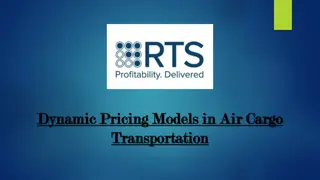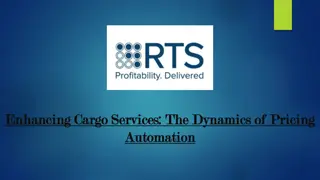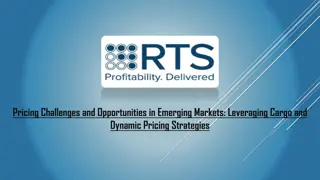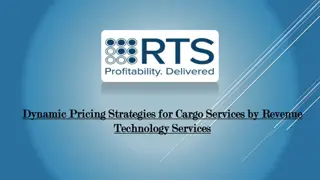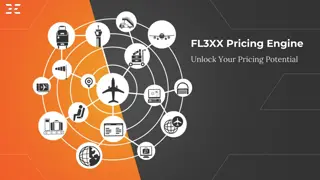
Dynamic Pricing Strategies in Response to Market Volatility
In the fast-paced and ever-changing world of cargo transportation, revenue technology services are pivotal in helping companies navigate market volatility through dynamic pricing strategies. These strategies, underpinned by sophisticated algorithms and real-time data analysis, ensure that cargo pricing remains competitive, flexible, and responsive to fluctuating market conditions.n
Download Presentation

Please find below an Image/Link to download the presentation.
The content on the website is provided AS IS for your information and personal use only. It may not be sold, licensed, or shared on other websites without obtaining consent from the author. If you encounter any issues during the download, it is possible that the publisher has removed the file from their server.
You are allowed to download the files provided on this website for personal or commercial use, subject to the condition that they are used lawfully. All files are the property of their respective owners.
The content on the website is provided AS IS for your information and personal use only. It may not be sold, licensed, or shared on other websites without obtaining consent from the author.
E N D
Presentation Transcript
In the fast-paced and ever-changing world of cargo transportation, revenue technology services are pivotal in helping companies navigate market volatility throughdynamic pricing strategies. These strategies, underpinned by sophisticated algorithms and real-time data analysis, ensure that cargo pricing remains competitive, flexible, and responsive to fluctuating market conditions.
Understanding Dynamic Pricing Dynamic pricing is a strategy where prices are adjusted in real-time based on market demand, competition, and other external factors. For the cargo industry, this means that prices can vary significantly based on variables such as fuel costs, supply chain disruptions, seasonal demand, and geopolitical events. Revenue technology services utilize advanced data analytics to monitor these variables and adjust pricing accordingly, ensuring optimal revenue generation. The Role of Revenue Technology Services Revenue technology services provide the essential tools and platforms that enable cargo companies to implement dynamic pricing effectively. These services typically include data analytics, predictive modeling, and machine learning algorithms that analyze vast amounts of market data. By leveraging these technologies, cargo companies can forecast demand, identify pricing trends, and make informed decisions that enhance profitability and customer satisfaction. Adapting to Market Volatility Market volatility presents both challenges and opportunities for the cargo industry. Sudden shifts in demand, unexpected supply chain disruptions, and fluctuating fuel prices can all impact cargo pricing. Dynamic pricing strategies allow companies to adapt swiftly to these changes. For instance, during periods of high demand, prices can be increased to maximize revenue, while in times of low demand, discounts and promotions can be offered to attract more customers. Revenue technology services play a crucial role in this adaptive process by providing real-time data insights and automated pricing adjustments. This ensures that cargo companies can respond to market changes promptly, maintaining a competitive edge.
Benefits of Dynamic Pricing in the Cargo Industry 1.Enhanced Revenue Management: Dynamic pricing allows cargo companies to optimize their revenue by adjusting prices based on demand and market conditions. This can lead to increased profitability, even in volatile markets. 2.Competitive Advantage: By leveraging dynamic pricing strategies, cargo companies can stay ahead of their competitors. Real- time pricing adjustments ensure that they are always offering the best rates, attracting more customers, and retaining market share. 3.Improved Customer Satisfaction: Dynamic pricing can also enhance customer satisfaction by providing fair and transparent pricing. Customers are more likely to trust companies that adjust their prices based on real-time market conditions rather than arbitrary increases. 4.Operational Efficiency: Automated pricing adjustments reduce the need for manual interventions, freeing up resources for other critical tasks. This improves overall operational efficiency and reduces the risk of human error. Challenges and Considerations While dynamic pricing offers numerous benefits, it also presents challenges. Companies must ensure that their pricing algorithms are accurate and that they have access to reliable market data. Additionally, there is a need to balance profitability with customer satisfaction, as frequent price changes can lead to customer dissatisfaction if not managed carefully.
Conclusion Dynamic pricingstrategies, supported by advanced revenue technology services, are essential for navigating market volatility in the cargo industry. By leveraging real-time data and predictive analytics, cargo companies can optimize their pricing, enhance revenue, and maintain a competitive edge. As the market continues to evolve, the ability to adapt swiftly and effectively through dynamic pricing will be a key determinant of success.
THANK YOU THANK YOU


